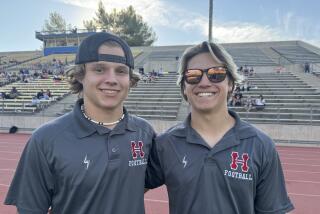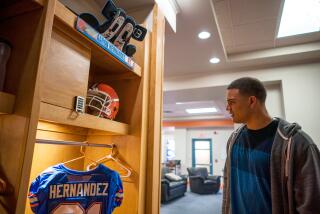Can’t Run From This Memory
- Share via
Bob Beaudette and I stand on the spot of outfield grass where we think Harold fell, 30 years ago this Aug. 31, on a Monday night, at Blake Field in La Habra.
Blake Field is no more. The baseball diamonds have been torn down to make way for a redevelopment project that has never quite developed.
What remains is a patch of untended fescue, the brick building we used to know as the snack shack, and a memory neither of us can shake.
Weeks before the football-related deaths of Korey Stringer, Eraste Autin and Rashidi Wheeler would make national headlines, Beaudette sent me a blast-from-the-past e-mail, our first contact since we were Pop Warner teammates on the 1971 La Habra Raiders.
Bob wanted to revisit “Harold.”
On a hot August evening, three decades ago, two teammates collided head-on during a tackling drill.
One got up; the other tried.
Harold took a few staggered steps and fell.
I will never forget the sight of his eyes rolling back as a coach cradled his head.
We were ordered to run laps as our coaches, Vic, “Scootch” and Bruce, tended to Harold.
We ran, and ran, and ran.
A hospital had recently opened one block from the field, but our panicked young coaches put Harold in a car and rushed him to St. Jude Hospital in Fullerton.
Harold never regained consciousness.
He died Sept. 3, 1971.
He was 10.
One of the coaches’ dads broke the news to us as we gathered for Friday practice. He said Harold died of a brain aneurysm.
Beaudette and I share little in common with current members of the Minnesota Vikings, Florida Gators and Northwestern Wildcats, except that now we all know what it feels like to suffer the loss of a teammate.
Bob and I can say without equivocation: Watching a young man die on a ball field is a memory that never fades.
I set up a lunch with Bob.
“I think about it a lot,” Beaudette says of Harold. “I don’t know what the reasons are. It doesn’t seem possible it was 30 years ago.”
It would be a lie to suggest Harold’s death consumed our daily thoughts. We played the 1971 season. We both remember it being fun.
Neither of us recalls feeling traumatized at the time.
Yet now, at age 43, Beaudette breaks down and cries when reflecting on the death of a boy we hardly knew?
“We didn’t have the perspective at the time,” says Beaudette, who does electrical contracting and lives less than a mile from what used to be Blake Field. “Thirty years later, you realize how young that kid was, and that he didn’t want to play football. He was out there because his mom and dad wanted him to be out there.”
Harold was, how to put this respectfully, not athletically inclined. He was oversized for his age yet two years younger than most of us.
None of that was his fault.
Bob remembers having to tell Harold how to put on his protective cup. Harold cried every day during August conditioning drills and became an easy tackling dummy for us veterans looking to score points with the coaches.
But why this emotion now?
“Maybe it’s a guilt thing,” Bob says. “Maybe it was the way we treated him.”
I set out to research Harold’s death, figuring it must have been big news. The La Habra Star, no longer a daily, was our local paper. The woman working the La Habra Library information desk told me there are no archives dating back that far.
The Fullerton Library had the Fullerton Daily News Tribune on microfilm, yet I was shocked to find the paper gave Harold’s story short shrift, even while reporting in three paragraphs the death was the “first Pop Warner football fatality in North Orange County.”
No interviews with coaches, teammates, doctors. No analysis. Nothing.
“Football Injuries Claim Youth, 10,” read the headline.
Thirty years later, Bob and I try to retrace our tracks that day at Blake Field. The playing fields are gone, but we find the trail that led to the back slope we knew as “The Hill,” which we ran daily as part of conditioning.
God, how Harold hated that hill.
Bob is right about the death having more impact as we grow older.
Did it affect me? Does it still?
Probably in ways I don’t know.
I remember, after Harold died, sitting in the car with my mom. She said if I didn’t quit the team she would not attend any of my games.
I didn’t quit and she never came.
I remember once, while serving as a beat reporter covering the Raiders, Coach Art Shell telling me I couldn’t possibly know what it’s like out there because I never played the game.
I wanted to ask Shell whether, in all his all-pro years, a teammate had ever fallen dead at his feet?
Might that revelation have qualified me to engage in meaningful conversation?
I regret never spitting out the words.
The deaths of Stringer, Autin and Wheeler are tragic, yet different.
Those players died doing what they loved.
Harold died doing something he loathed.
Standing in the open field, I ask Bob if he thought Harold, had he not met his fate on this square of real estate, would have eventually quit.
Bob reckons he wouldn’t have lasted the week.
Perhaps Harold’s death remained with Bob long enough for the Internet to have been invented, so that he could electronically pass along his pent-up emotions.
So that I, in turn, could type these words to be read by a parent who might be pushing his son out the car door for football conditioning.
Maybe that son was born to be an entomologist.
Maybe, because of memories welled up in Bob, and forwarded with a mouse click, a father might grab his 10-year-old firmly by the face mask this week and say, “You . . . do . . . not . . . have . . . to . . . do . . . this.”
Maybe the kid will take his dad up on the offer.
More to Read
Go beyond the scoreboard
Get the latest on L.A.'s teams in the daily Sports Report newsletter.
You may occasionally receive promotional content from the Los Angeles Times.











